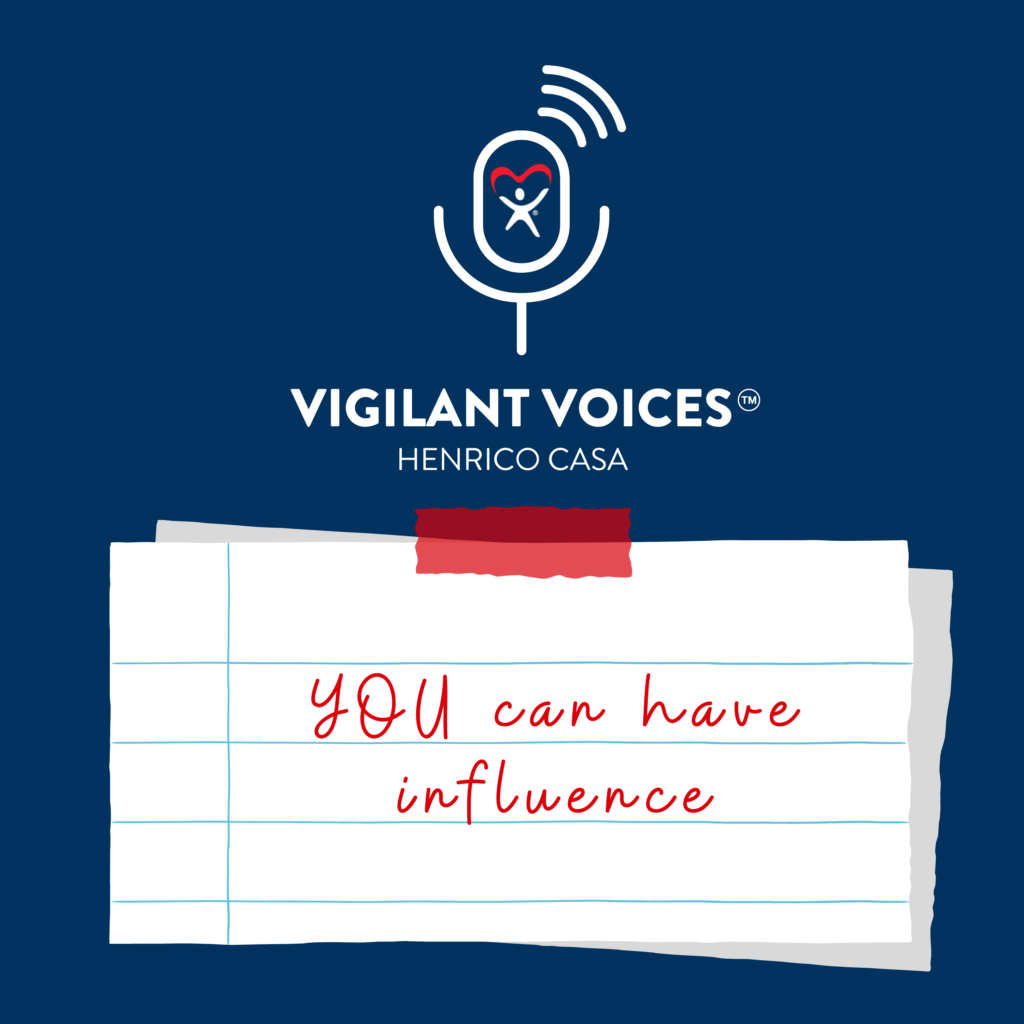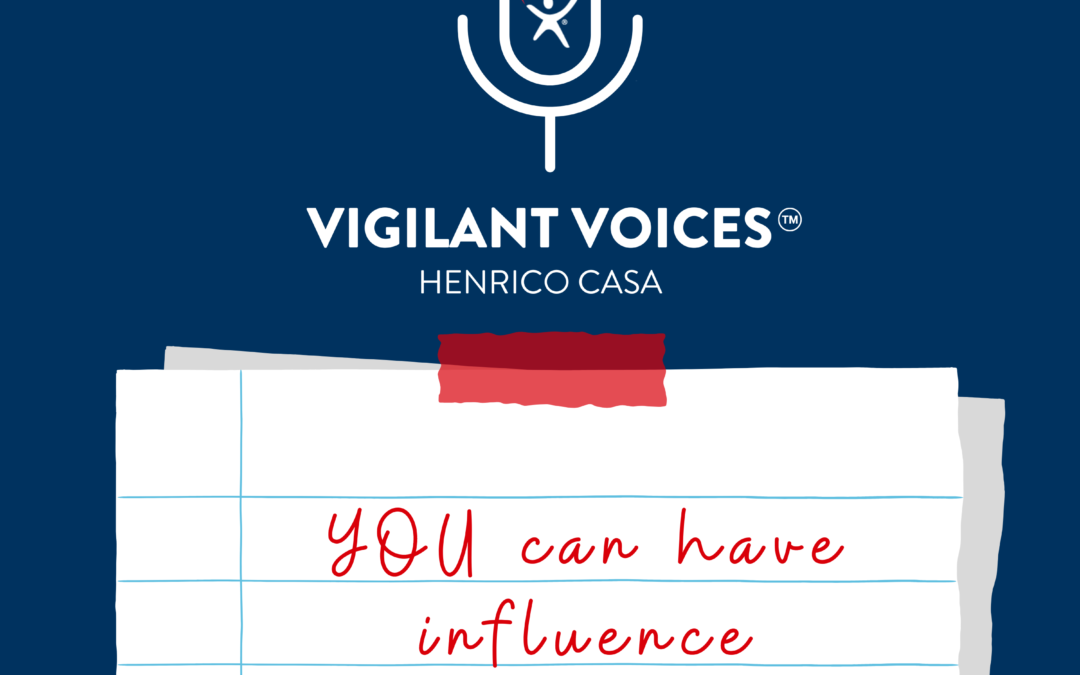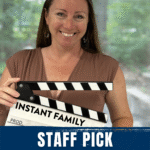
Listen to Episode 21 of the Vigilant Voices™ podcast, YOU Can Have Influence.
Jeannine Panzera: Welcome to yet another episode of our Vigilant Voices™ podcast.
Kristin Blalock: We’re happy to have you with us because our goal is for all of us to KNOW more about the challenges facing children and families so that we can ensure NO child faces continued abuse, neglect, or trauma.
J: We’ve said this before and we’ll say it again, our type of advocacy – what we do as Court Appointed Special Advocates – is individual advocacy. We speak up for the specific needs of a child…
K: Right. That particular child’s unique, individual needs.
J: Yes. But the individual needs of a child and how we meet those needs are both affected by decisions made for all children at a much higher level.
K: And that’s the policy level or you could say the government level.
J: And we want to talk about that today because it’s the season for Virginia’s General Assembly, which is the encompassing term for both our state’s House of Delegates and Senate. Our elected official are meeting now through March, discussing issues, hearing from lobbyists, considering bills, resolutions, and so forth.
K: Right. And before we dive into that, let me start off with the story of a young child who we’ll call Morgan. Morgan has grown up without a relationship with his incarcerated father, and has had to navigate ongoing neglect and instability. And that’s because Morgan’s mother is consumed with a variety of trials, including mental health challenges, addiction. She’s had erratic incarcerations herself and problems with probation violations. And she’s also struggled with unemployment.
J: Yeah, that’s a lot. And I think when we have all of these issues that are so complex, they compound and just make for a really complicated situation.
K: Yes. Not to mention that these issues really tax the people around you. This mother now has strained, volatile relationships with her family and friends who may have potentially been in a place to help Morgan. But what I want to point out with this case and why I chose this for today is that in a situation like this, there are so many high level policies and systems affecting this family. Not just affecting the family, but affecting this individual child.
J: Right. So I think then that leads into the question of the day for this episode: How does legislation affect individual children in our community? Like, let’s say children like Morgan.
K: Right. And it does in so many ways. It affects the children we serve at CASA. It affects all children in foster care. But, listener, it affects your children and the children down the street. The laws, the bills, the policies. And what we learned in talking with Eric Reynolds, the director of Virginia’s Office of the Children’s Ombudsman, is that a bill can pass, but then the budget also needs to pass for that bill to even be funded.
J: Yes. Right. So before we get overwhelmed by all of these policies and budgets. Maybe it makes sense for us to explore kind of a couple of topic areas. I think that makes sense. We can break it down a little bit because there are general issues or categories that we can identify, and then within those, we can talk about some of the ways that high level policies might trickle down to then directly affect our children in our community.
K: So the topic areas I know that come to my mind when I think about child well being are things like education, mental health, health care, and economic security.
J: Those are definitely spot on. And then I think that we could add to that general child welfare category, like maybe the policies and funding around Virginia’s department of.
K: Yeah, yeah. Okay, good call. And we’re chatting about this today because I think… Okay, well, I won’t assume anything about you, Jeannine, or you, listener. So I’ll say that I know that I forget about the whole legislative process as I go about my day to day life. I’m living my little daily routine, and there’s this small group of people, people we elected, who are considering and debating very important policies.
J: That is definitely true. And those high level policies, and then the funds. The money that are tied to them really do dictate then what services are available to us, what programs are ultimately funded. Changes that we might see all stems from this.
K: Yes. So, thinking of topic areas related to children, let’s talk about education. And that category clearly affects our public school system – policies and funding there. But I think it’s important to note that legislators consider things beyond kind of those school basics. There are programs like safer community programs and firearm violence protection policies, things like that. And then, in addition, there’s also the whole realm of early education, like policies that affect that key zero to five age group.
J: Yes, that is totally key. And we know that what happens in that early age range really can affect everything to come. And really, what it’s about is giving children that strong foundation, because those early childhood experiences affect the actual development of the brain and the architecture and even, like, the structure, you could argue. Right. And the reason that’s important is because that’s providing the foundation for all the future learning, behavior, and health. And this is kind of interesting. I didn’t quite know that it’s the time between birth and age three where it’s the most rapid brain development, where billions of connections between these individual neurons are established. And then those have to be an active part, because it just can change everything it does. It’s just foundational.
K: And another fun fact. I read that 90% of a child’s brain is developed by age five.
J: Exactly.
K: They’re entering kindergarten with almost a full brain.
J: Right. And we hope that it’s well developed because think about everything it needs to develop. And I also did see in this same capacity that if we have healthy childhood experiences early on. Right. In those keys, zero to 3 to five, then children are much more likely to reach milestones that are critical to future individual and community success. That’s reading proficiency, high school development, secondary education, gainful employment, lifetime mental health and well being. And an avoidance of substance use disorders and crime. Right. So it’s so important. And so that’s why creating those early education options really could greatly impact the welfare of children in our area. And so that includes policies around things like maybe actual education options and outcomes, but then also ways to maybe make it more affordable for everyone. Tax credits, things like that.
K: Yeah. And for this age group, that might not look like school. Right, because they’re preschool age, but accessible childcare options that have the tools and resources to help children learn are key at this age.
J: Yes. And so then when I think about school services, I also think about the importance of our school counselors and mental health support, especially right now. But I think that would then fall under the category of mental health. Yet it might be in the educational setting. I think we’ve pressed on this and touched on this a little bit about how much an issue we are seeing right now in the youth mental health arena that really is a crisis. And the percentage of children and teens reporting anxiety and depression really is quite alarming. And I was looking a little bit at this the other day, Kristin, and what’s interesting is that mental health challenges are the leading cause of disability and poor life outcomes in young people right now. Wow. Which I, not sure I had kind of seen it, like, written so stark like that. Then you add things like the pandemic and how that has put us in a slightly different capacity. But I read from the Centers for Disease Control and Prevention. Right. CDC, that in the ten years leading up to the pandemic, feelings of persistent sadness and hopelessness, as well as suicidal thoughts and behaviors, increased by about 40% among our young people.
K: So disheartening. Young people are so bright and lovely, and I just want them to know that!
J: I know. And then all these difficulties, right. On top of growing concerns about social media, mass violence, natural disasters, climate change, political.
K: And they see all of it. They aren’t growing up in a silo.
J: That’s right. And so I think what happens is you take all of those higher level society issues that we see, plus the normal ups and downs of being a teenager. Right. All those hormones and those feelings, it can feel insurmountable. But then that prolonged stress, that’s what leads to anxiety, depression, and then sometimes behavioral difficulties. And there’s no easy fix.
K: And this is where policies and decisions at a high level come into play. We need to ensure a continuum of mental health services that address the full spectrum of needs and interventions. So that includes things like crisis units, school based mental health services, where the children and youth are. It makes sense to offer services there at school. Psychiatric emergency programs, outpatient programs, inpatient services. There’s just so much that could be offered.
J: Yes. And I think this is also where, if we thought about some of these things more holistically than siloed, we might start to get someplace. Where are we intersecting on all of these? And so then the challenges that I think we hear people speak to: every day, lack of funding for additional counselors at schools. There’s no beds at psychiatric facilities for children in crisis. These are things that need to be addressed at a policy level.
K: Yeah, but we feel them at an individual level, and that’s why this is so important.
J: Right. Because we know that that can impact the ability for families and children to actually get services. Right. Yes. And so another category of issues that we definitely feel on that individual level with our work is the topic generally of welfare. Yes. And this addresses that world of social services that I mentioned and the foster care component. And it’s policies that govern those programs, as well as funding for those key, crucial staff positions. Yes. And there’s so much to the foster care system. Right. Like, we just say it like this one little system, but especially the older youth.
K: I feel like we, and I’m saying the collective, we have been failing them. For years now, Virginia has been ranked around 48 or 49 out of the 50 states. So that is not good.
J: That is failing.
K: Yes. For the rate at which youth age out of foster care, that means the number or the rate of teens that are entering adulthood without stability or a permanent family.
J: And as we know, that sets them up for significant challenges. And it really has been an issue for years that we’ve been watching. But I will say I was happy to see in the 2023 session last year approvals for some things for our foster youth, like programs to support workforce development, after school programs, getting them driver’s license, helping with some of those just independent skills that they need.
K: Right. And I remember also seeing that there were positive changes for assistance for kinship care providers, which we know is huge for the children we serve, to have someone that they know and they’re familiar with to go to when they have to leave their own home, a game changer completely.
J: And then another one that we might not necessarily immediately think of in terms of child welfare, but it truly is economics. And the economic policies. Yeah, totally. The economic stability and well being of parents clearly affects their children. And when parents or caregivers can’t provide food, shelter, transportation, et cetera, it significantly impacts a child and puts them on an uneven playing field with their peers who maybe aren’t facing these hardships. Exactly. And examples of policies that might fit in this bucket are those that address TANF, temporary assistance for needy families, those benefits, maybe the family medical leave, homeless supports, tax credits could go on and on. It does. And so, really, I just think we really need to be aware and think about the fact that there are so many legislative decisions that drive the systems that affect our children.
K: Yeah, children like Morgan from our CASA case story. So for four years now, Morgan’s advocate has walked with him, being encouraging to the relative who now has custody of Morgan, and helping to coordinate resources like counseling. This advocate’s investigation and observations have been critical to the court’s ability to make decisions to uphold Morgan’s safety and get him all of the supports he needed. So all of these things we’ve talked about were on the list of things that Morgan needed. And there have been many ups and downs, maybe even with more to come. But Morgan’s caregiver recently told us that he felt like CASA was just crucial to resolving all of the matters at hand. And that’s a win for us.
J: That’s a huge win for us. That’s amazing. And also just what an amazing commitment that this advocate has dedicated to Morgan and his family. For a family like this, navigating complex systems and resources, it really can be a game changer and be so helpful to have someone in your court helping you get what you need.
K: Yeah. And someone who you trust to be looking out for the best interest of your child, not influenced by the drama of family relationships or overwhelmed by these complex.
J: I agree completely. So I guess thinking on our discussion as we wrap up here, Kristin, what we talked about today was just a high level, quick overview of some of these complex programs and systems. But we wanted to do this to lay the foundation for you, because in our next episode, we are going to be talking with another very special guest. And her name is Allison Gilbreath, who is the Senior Director of Policy and Programs at Virginia Voices for Children.
K: And I’m so excited about that because while we give voice to individual children, their organization sp eals up for children at that higher systems level. They are a counterpart ot us of sorts.
J: They are. And so the call to action that we leave you with today is simple. Sign up for Virginia Voices for Children’s email updates so that you are in the know during the General Assembly.
K: Yes – see their priorities for the well-being of children: the bills they support and updates on the status. Because the decisions made at this high level affect every single child you know!








